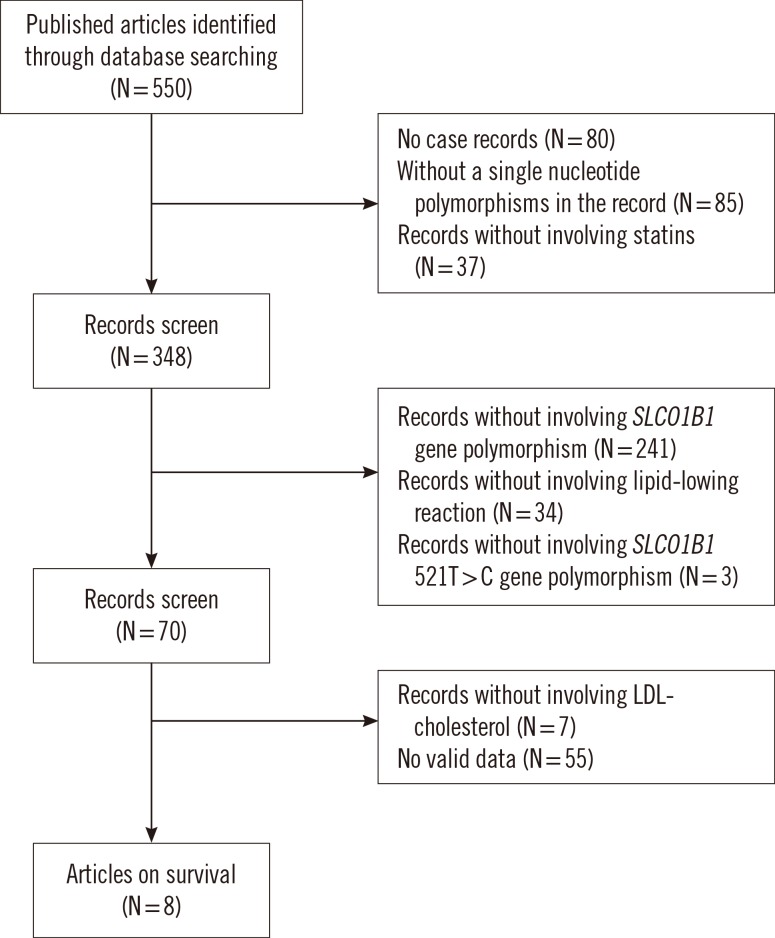Ann Lab Med.
2015 May;35(3):329-335. 10.3343/alm.2015.35.3.329.
Meta-Analysis of the SLCO1B1 c.521T>C Variant Reveals Slight Influence on the Lipid-Lowering Efficacy of Statins
- Affiliations
-
- 1Key Laboratory of Biomedical Engineering & Technology of Shandong High School, Shandong Wanjie Medical College, Zibo, China. wql_zcq@126.com
- 2Sports Science Research Center of Shandong Province, Jinan, China.
- 3College of Agronomy and Plant Protection, Qingdao Agricultural University, Qingdao, Shandong, China. eyzhang@sina.com
- KMID: 2363205
- DOI: http://doi.org/10.3343/alm.2015.35.3.329
Abstract
- BACKGROUND
Several studies have focused on the association between the lipid-lowering efficacy of statins and the SLCO1B1 c.521T>C polymorphism; however, the results are conflicting. The effects of statins show significant variability between individuals. This meta-analysis aimed to investigate the effects of the SLCO1B1 c.521T>C polymorphism on the lipid-lowering effects of statins.
METHODS
We systematically searched PubMed and Web of Science to screen relevant studies. Meta-analysis was performed to identify the association between SLCO1B1 c.521 polymorphisms and the lipid-lowering effects of statinson the basis of the standard mean difference (SMD) and 95% confidence intervals (CIs). Additionally, we checked for heterogeneity (I 2) among studies and evidence of publication bias. We obtained eight studies including 2,012 wild genotype (T/T) and 526 variant genotype (T/C and C/C) cases.
RESULTS
No significant difference was observed in the lipid-lowering efficacy of statins between the wildand variant genotypes of SLCO1B1, with a pooled SMD of 0.03 (95% CI: -0.07-0.13). Furthermore, there was no significant effect in the meta-analyses of the variant heterozygote, homozygote, and Chinese populations. Subgroup meta-analysis indicated that the timerequired for the statin to take effectdid notsignificantly affect the association between lipid-lowering efficacy of statins and SLCO1B1 c.521T>C polymorphism. However, thewild genotype improved the lipid-lowering efficacy of simvastatin with a pooled SMD of -0.26 (95% CI: -0.47- -0.05).
CONCLUSIONS
No significant association was detected between the lipid-lowering efficacy of statins and the SLCO1B1 c.521T>C polymorphism, with the exception of simvastatin.
Keyword
MeSH Terms
-
Alleles
Databases, Factual
Genotype
Humans
Hydroxymethylglutaryl-CoA Reductase Inhibitors/*therapeutic use
Hyperlipidemias/drug therapy/genetics
Polymorphism, Single Nucleotide
Solute Carrier Organic Anion Transporter Family Member 1b1/*genetics
Hydroxymethylglutaryl-CoA Reductase Inhibitors
Solute Carrier Organic Anion Transporter Family Member 1b1
Figure
Reference
-
1. Sortica VA, Fiegenbaum M, Lima LO, Van der Sand CR, Van der Sand LC, Ferreira ME, et al. SLCO1B1 gene variability influences lipid-lowering efficacy on simvastatin therapy in Southern Brazilians. Clin Chem Lab Med. 2012; 50:441–448. PMID: 22505549.
Article2. Zhang P, Wang M, Zhang H, Wang Q. Effects of statins on rat liver microsomal aspirin esterase activities in vitro. Lat Am J Pharm. 2013; 32:1501–1507.3. Igel M, Arnold KA, Niemi M, Hofmann U, Schwab M, Lütjohann D, et al. Impact of the SLCO1B1 polymorphism on the pharmacokinetics and lipid-lowering efficacy of multiple-dose pravastatin. Clin Pharmacol Ther. 2006; 79:419–426. PMID: 16678544.4. Hedman M, Antikainen M, Holmberg C, Neuvonen M, Eichelbaum M, Kivistö KT, et al. Pharmacokinetics and response to pravastatin in paediatric patients with familial hypercholesterolaemia and in paediatric cardiac transplant recipients in relation to polymorphisms of the SLCO1B1 and ABCB1 genes. Br J Clin Pharmacol. 2006; 61:706–715. PMID: 16722833.5. Fu Q, Li YP, Gao Y, Yang SH, Lu PQ, Jia M, et al. Lack of association between SLCO1B1 polymorphism and the lipid-lowering effects of atorvastatin and simvastatin in Chinese individuals. Eur J Clin Pharmacol. 2013; 69:1269–1274. PMID: 23263738.6. Pasanen MK, Fredrikson H, Neuvonen PJ, Niemi M. Different effects of SLCO1B1 polymorphism on the pharmacokinetics of atorvastatin and rosuvastatin. Clin Pharmacol Ther. 2007; 82:726–733. PMID: 17473846.7. Pasanen MK, Neuvonen M, Neuvonen PJ, Niemi M. SLCO1B1 polymorphism markedly affects the pharmacokinetics of simvastatin acid. Pharmacogenet Genomics. 2006; 16:873–879. PMID: 17108811.8. Zhang W, Chen BL, Ozdemir V, He YJ, Zhou G, Peng DD, et al. SLCO1B1 521T-->C functional genetic polymorphism and lipid-lowering efficacy of multiple-dose pravastatin in Chinese coronary heart disease patients. Br J Clin Pharmacol. 2007; 64:346–352. PMID: 17439540.9. Tachibana-Iimori R, Tabara Y, Kusuhara H, Kohara K, Kawamoto R, Nakura J, et al. Effect of genetic polymorphism of OATP-C (SLCO1B1) on lipid-lowering response to HMG-CoA reductase inhibitors. Drug Metab Pharmacokinet. 2004; 19:375–380. PMID: 15548849.10. Yang GP, Yuan H, Tang B, Zhang W, Wang LS, Huang ZJ, et al. Lack of effect of genetic polymorphisms of SLCO1B1 on the lipid-lowering response to pitavastatin in Chinese patients. Acta Pharmacol Sin. 2010; 31:382–386. PMID: 20140004.11. Stang A. Critical evaluation of the Newcastle-Ottawa scale for the assessment of the quality of nonrandomized studies in meta-analyses. Eur J Epidemiol. 2010; 25:603–605. PMID: 20652370.
Article12. Bailey KM, Romaine SP, Jackson BM, Farrin AJ, Efthymiou M, Barth JH, et al. Hepatic metabolism and transporter gene variants enhance response to rosuvastatin in patients with acute myocardial infarction: the GEOSTAT-1 Study. Circ Cardiovasc Genet. 2010; 3:276–285. PMID: 20207952.
- Full Text Links
- Actions
-
Cited
- CITED
-
- Close
- Share
- Similar articles
-
- Effect of SLCO1B1 T521C on Statin-induced Myotoxicity: A Systematic Review and Meta-analysis
- Statin Use and the Risk of All-cause Mortality
- Role of Blood Lipid Levels and Lipid-Lowering Therapy in Stroke Patients with Different Levels of Cerebral Artery Diseases: Reconsidering Recent Stroke Guidelines
- Cholesterol Lowering Therapy in Coronary Artery Disease: With Particular Reference to Statins
- Statin Intolerance: an Overview of the Current Status and Possible Treatment Options




